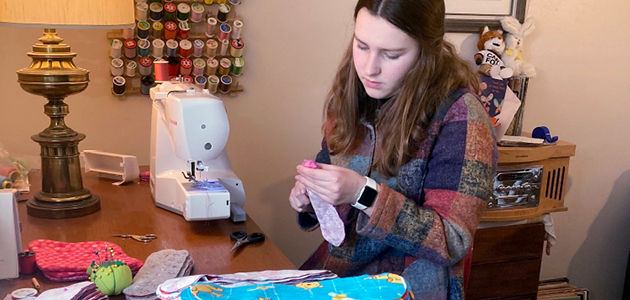Women’s History Month is an annual celebration that recognises the contributions women and girls have made to our society. It highlights and honours past and current history-making changes from women around the world. The celebration started as a smaller celebration in Santa Rosa, California, organised by The Education Task Force of the Sonoma County Commission on the Status of Women in 1978.1
Eventually, it grew to a monthlong celebration in 1987, when the US government designated March as National Women’s History Month to recognise the accomplishments of women throughout history. Countries like the UK and Australia also celebrate women’s history in March, while in Canada, Women’s History Month takes place in October.
This year at Foresters, we’re sharing inspiring member stories about women supporting each other and working to end period poverty. It’s estimated that nearly 500 million women and girls don’t have proper access to menstrual hygiene tools and resources.2 Period poverty affects women from all over the world, and it’s an issue that many women, like the ones in this article, are stepping up to help end.
Vicky Stubbins
Vicky is a Foresters member who used our Foresters grants recently to support a not-for-profit called Red Box that tackles period poverty. This organisation helps young people throughout their periods by providing red boxes filled with products like pads, tampons and underwear.
This community-based charity is mainly focused on helping local schools and universities support their students during their periods. The goal is to ensure girls and women aren’t missing out on their education due to not having the products they need to manage their periods.
Working with Red Box brought this issue to the forefront for Vicky and gave her more insight into the importance of menstrual equity. “There are so many girls that miss school because of being on their periods, and so many don’t get provided with the basics during that time.”
Vicky started with a Foresters Care grant and used it to help fill red boxes for the cause. But this one grant activity eventually led to another for Vicky. Using her Community Volunteer grant, she helped support Red Box again by making up even more boxes for a larger local school. “There were 120 girls in two different year groups affected that needed help.”
Using her grant funds, Vicky purchased all the supplies these girls needed and assembled them into care boxes delivered to the school. She wanted to do her part for these girls and lend this charity a hand. “There’s just absolutely no way that this little charity would be able to help and support this school.”
Taylor Wenten
Taylor was a 2021 Foresters Competitive Scholarship winner who partnered with a non-profit organisation to help women and girls in need globally.
After a family friend traveled to Africa with Hope Without Borders, Taylor learned more about the non-profit, including their project to supply women in different countries with reusable pads. “This was closely linked to my Girl Scout Gold Award topic of period poverty, and I decided to contact them.”
Taylor started creating reusable pads after considering other solutions to period poverty. She learned about the issues with non-reusable pads and menstrual cups from Hope Without Borders’ founder, Dr. Parve, and was convinced to help the organisation create reusable pads.
The project involved her friends, family and other members of her community. “I had sewing and cutting parties at my church, with a sewing club at my school, and I also hosted a party at my house with my grandma, mum, aunt and neighbour.”
Taylor also got help from seniors at a local center to help make the pads. “This project taught me how important it is to recruit help. I could not have had as big of an impact if I was working by myself.”
Working on this project opened Taylor’s eyes, “It is easy to forget how lucky we are as women to have access to period care products in America.” It also inspired her to continue promoting menstrual equity and giving back to women and girls in need, “I set up an event for a younger Girl Scout Troop to do annually. They had a cutting event last year, and I provided them with stencils, scissors and sharpies so they could cut out the pad pattern.”
For Taylor, giving back is all about going after what you’re passionate about. “Find a topic that either excites you or maybe even something that makes you a little bit angry and makes you desire change.”
Charities fighting to end period poverty
We’ve already talked about Red Box and Hope Without Borders in the stories above, but those are just two of many organisations working to end period poverty and fight gender bias and inequality. If you want to learn more about period poverty and the work being done to make a difference, here are a few more charities to look into:
- Freedom4Girls – A UK-registered charity that supports people who menstruate and fights the stigmas and inequalities of menstruation through educating people and providing different solutions to period poverty.
- The Period Purse – This non-profit founded in Toronto, Ontario, Canada, works to provide sustainable access to menstruation products for everyone who menstruates. They are dedicated to helping menstruation be more widely understood and respected.
- PERIOD. The Menstrual Movement – PERIOD. is a non-profit that is completely powered by today’s youth. This organisation is all about equipping and training youth globally with the resources they need to end period poverty and the stigma behind menstruation.
You can help too
Our members can access amazing grants like Community Volunteer and Foresters Care to help local causes and charities that mean the world to them. If you’re feeling inspired to help end period poverty and support women in your community, log in to MyForesters now and learn more about our grants and the other benefits you can use today!
SOURCES
1 https://www.womenshistory.org/womens-history/womens-history-month
2 https://jamanetwork.com/journals/jama-health-forum/fullarticle/2783499




